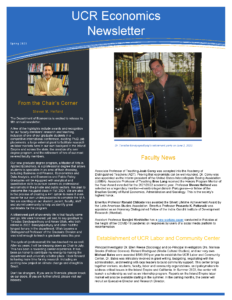WELCOME TO THE UCR DEPARTMENT OF ECONOMICS
At the undergraduate level, the Department offers B.A. majors in economics; business economics; economics and administrative studies; and economics, law and society. At the graduate level we offer a Ph.D. in economics. All of our programs provide students a comprehensive training in modern economic theory, empirical techniques and policy evaluations as well as opportunities to take courses in a wide range of areas of specialization.
The Department includes faculty experts in microeconomics, macroeconomics, econometrics, economic development, international economics, labor economics, money, credit and business cycles, resource and environmental economics and public economics. Their research is in theory as well as applied to policy issues. For more information see Faculty Research.
M.A. in Applied Economics coming in Fall 2026
The M.A. with a concentration in Applied Economics is primarily designed to prepare students for professional careers in the private sector, government, and international agencies. It can also prepare students for Ph.D. programs in economics.
See the catalog description here for additional details. Applications are to be accepted in Fall 2026.
Contact Michael Bates (mbates@ucr.edu) for more information.
Reaching new levels of excellence
UCR has earned several high rankings this year, including being named No. 1 in social mobility — again. Watch a video to see where else the university excels.
OUR LATEST NEWSLETTER
NEWS SPOTLIGHT
Professor wins grant to study juvenile incarceration
Economics Professor Ozkan Eren has received a $244,721 grant from the Laura and John Arnold Foundation. The two-year grant will be used to study the long-term effects of juvenile incarceration and its spillover effects on family members.
The Pittsburgh Post-Gazette (a leading Pennsylvanian newspaper ranked about 44 in the whole country) recently published Ugoantonio Troiano’s op-ed where he proposes a better way to deal with asylum seekers.
The Washington Post covers the article “The Introduction of the Income Tax, Fiscal Capacity, and Migration: Evidence from US States” which Ugoantonio Troiano co-authored with Mark Dincecco and Traviss Cassidy. The article is focused on the historical introduction of the income tax in the US states and proves how the income tax does not have only direct effects (increased government revenues) but also indirect effects, as the introduction of the income tax induced significant outmigration to non-income-tax states by middle- and high-earning households.
Congratulations to Aman Ullah, Distinguished Professor and emeritus, in the Department of Economics, for receiving the Outstanding Paper Award from the International Journal of Forecasting (IJF) for his paper on forecasting interval-valued data. The paper, joint with T.S. Tuang Buansing and Amos Golan, was published in the IJF in 2020 and was selected as the best paper among all the papers published in the journal in the previous two-year period. The award recognizes the originality, quality, and impact of the paper in the field of forecasting.
The paper proposes a novel and efficient method for forecasting data that consists of lower and upper bounds rather than single values. The authors apply their method to forecast the daily returns of the SP500 index up to five days ahead using 13 years of data. They show that their method outperforms other methods that are commonly used to forecast interval data under various criteria. You can read their paper here. Congratulations, Aman!
Professor of Economics Steven Helfand received the honor of becoming a Fellow of the Brazilian Society of Agricultural Economics (SOBER). SOBER calls its Fellows “legendary members” in Portuguese. His new title represents society’s highest honor. Professor Helfand has been a member of SOBER since 1999. He traveled to Brazil in August 2022 to attend the ceremony to accept the award. [Read More]



